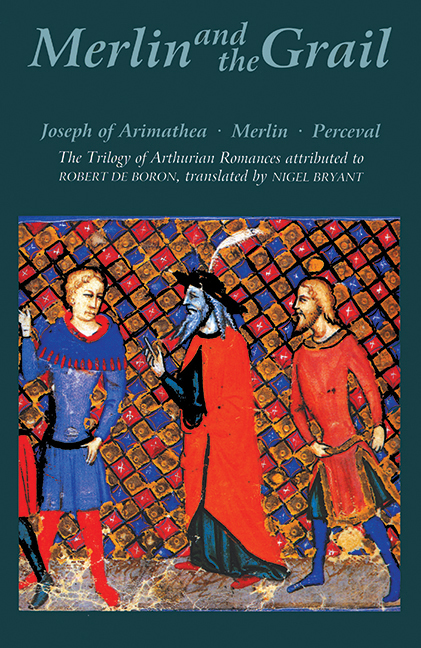 Merlin and the Grail
Merlin and the Grail Introduction
Published online by Cambridge University Press: 11 May 2017
Summary
‘With the obvious exception of Chrétien de Troyes, the most influential writer within the French romance tradition may well be Robert de Boron.’ So Norris J. Lacy has written; and it is surely no exaggeration. Not only in the development of the Grail legend, but in the evolution of Arthurian literature as a whole, it would be hard to overstate the importance of this trilogy of prose romances. Relatively short though they may be, these works attributed to Robert de Boron not only gave a vital new impetus to the story of the Grail left unfinished by Chrétien de Troyes, but were also to prove an inspiration to later writers, showing the way forward by combining a series of narratives to create the very first cycle of Arthurian tales. For the redactor of the version translated here was not content merely to take the Grail as the object of a chivalric quest and go back in time to tell the story of its origins in the Biblical past; nor was he content to move on and see the Grail quest brought to a conclusion; he went further, and gave his audience a resolution to the whole Arthurian story by finishing his Perceval with an account of the betrayal and death of Arthur and the end of the knights of the Round Table. This trilogy is astonishingly ambitious, original and complete in its conception.
The Modena manuscript
The Joseph of Arimathea has survived in seventeen manuscripts, most of which also contain Merlin, but only two go on to contain the entire trilogy of Joseph, Merlin and Perceval: manuscript E.39 of the Biblioteca Estense in Modena, and nouv.acqu.no.4166 of the Bibliothèque Nationale, Paris (formerly named the ‘Didot’ manuscript after a past owner – hence the title Didot-Perceval often applied to the third part). These manuscripts have not necessarily been used as the bases for modern editions: both Richard O'Gorman in his parallel edition of the verse and prose versions of Joseph (Toronto, 1995) and Alexandre Micha in his edition of Merlin (Geneva, 1979) argue at length for the superiority of other manuscripts, each editor finally opting for a different text. But Bernard Cerquiglini, in his edition of the complete trilogy, follows the text simply of the Modena manuscript.
- Type
- Chapter
- Information
- Merlin and the Grail<I>Joseph of Arimathea, Merlin, Perceval</I>: The Trilogy of Arthurian Prose Romances attributed to Robert de Boron, pp. 1 - 14Publisher: Boydell & BrewerPrint publication year: 2001
